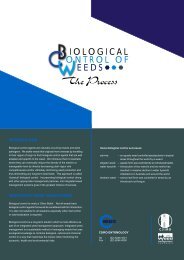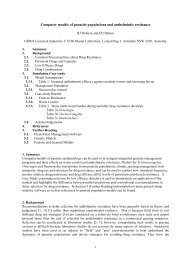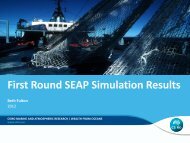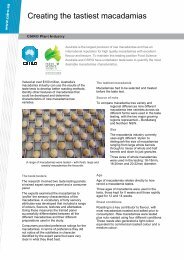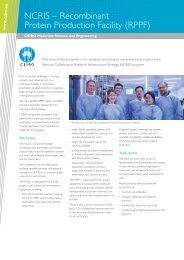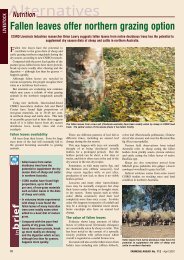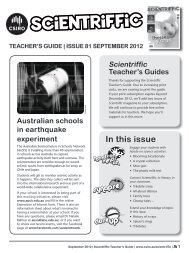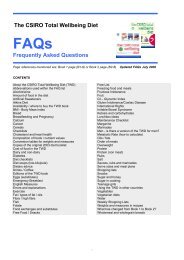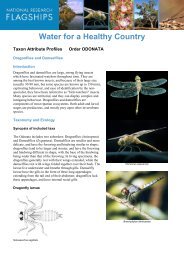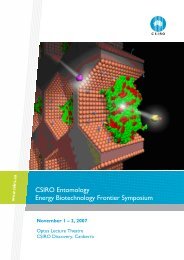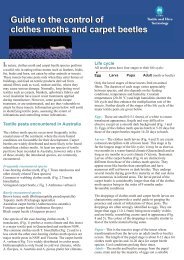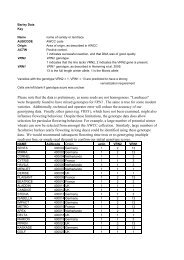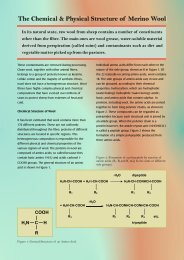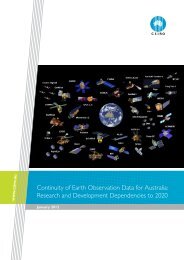WfHC - cover page (not to be used with pre-printed report ... - CSIRO
WfHC - cover page (not to be used with pre-printed report ... - CSIRO
WfHC - cover page (not to be used with pre-printed report ... - CSIRO
You also want an ePaper? Increase the reach of your titles
YUMPU automatically turns print PDFs into web optimized ePapers that Google loves.
Edwin David and Alan Creek‟s recollections both show their ability <strong>to</strong> apply general<br />
knowledge about the landscape <strong>to</strong> the specific work situation on the station. The men were<br />
foc<strong>used</strong> on getting a particular job done, and the knowledge they gained and then developed<br />
<strong>with</strong> experience was foc<strong>used</strong> on that role. Cattle work had a substantial influence on<br />
currently existing knowledge about Oriners (amongst both Indigenous and non-Indigenous<br />
people). However the industry relied on workers who also had a much older source of<br />
knowledge of the landscape. 2.7.2 <strong>be</strong>low reviews some relevant linguistic examples of that<br />
knowledge.<br />
2.7.2 Linguistic classifications and categories<br />
The linguist Philip Hamil<strong>to</strong>n under<strong>to</strong>ok extensive research on the Oykangand and Olkol<br />
languages, and one major result of that research is an online multimedia dictionary<br />
(http://www.oocities.org/athens/delphi/2970/index.html). The dictionary contains an<br />
alpha<strong>be</strong>tical list, as well as words organised in<strong>to</strong> a range of categories, including flora, fauna,<br />
and material culture. 33 Categorisation and classification has <strong>be</strong>en an important aspect of<br />
comparative anthropological and linguistic research <strong>be</strong>cause of its implications for human<br />
cognition (Levi-Strauss 1966; Ellen and Reason 1979; Ellen 1993). This is well <strong>be</strong>yond the<br />
scope of the current applied study, and the research did <strong>not</strong> focus on formal categories and<br />
classifications. Nevertheless in addition <strong>to</strong> research insights, focus on local classifications<br />
can also generate resources <strong>with</strong> a stronger local public and Indigenous community<br />
orientation (Wightman, Garalnganjak Ro<strong>be</strong>rts et al. 1992; Luke, Luke et al. 2011). In effect,<br />
this short section simply demonstrates a<strong>not</strong>her aspect of Indigenous understanding that is<br />
important <strong>to</strong> <strong>not</strong>e in a more general and intercultural synthesis, which <strong>be</strong>cause of its<br />
orientation and resource constraints, can<strong>not</strong> engage fully <strong>with</strong> the knowledge suggested by<br />
linguistic studies from the area.<br />
The following references taken from the dictionary demonstrate its content through three<br />
aquatic animal species mentioned in the <strong>report</strong>:<br />
Entry 1<br />
Giant long-armed prawn, Macrobrachium rosen<strong>be</strong>rgii<br />
Figure 42. Giant long-armed prawn, Macrobrachium rosen<strong>be</strong>rgii (image: P. Hamil<strong>to</strong>n)<br />
The giant long-armed prawn, Macrobrachium rosen<strong>be</strong>rgii (family Palaemonidae), also<br />
commonly called cherabin, is found in permanent freshwater streams and waterholes<br />
across northern Australia and in brackish water and estuaries. Prawns are similar <strong>to</strong><br />
crayfish but their arms are long <strong>with</strong> fine claws.<br />
33 The site also contains information on plant uses, reflecting Hamil<strong>to</strong>n‟s collaboration <strong>with</strong> Jeff Stewart<br />
on the unpublished ethnobotany, but the public website contains less detail than the <strong>report</strong> in<br />
Kowanyama community archives.<br />
Working Knowledge at Oriners Station, Cape York<br />
123



